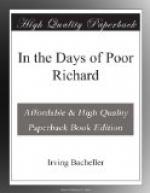“What do you regard as your most important discovery?” one of the ladies inquired.
“Well, first, I naturally think of the hospitality of this house and the beauty and charm of the Lady Howe and her friends,” Franklin answered with characteristic diplomacy. “Then there is this wine,” he added, lifting his glass. “Its importance is as great as its age and this is old enough to command even my veneration. It reminds me of another discovery of mine: the value of the human elbow. I was telling the King’s physician of that this morning and it seemed to amuse him. But for the human elbow every person would need a neck longer than that of a goose to do his eating and drinking.”
“I had never thought of that,” Lady Howe laughingly answered. “It surely does have some effect on one’s manners.”
“And his personal appearance and the cost of his neckwear,” said Franklin. “Here is another discovery.”
He took a leathern case from his pocket and removed from it a sealed glass tube half full of a colorless liquid.
“Kindly hold that in your hand and see what happens,” he said to Lady Howe. “It contains plain water.”
In half a moment the water began to boil.
“It shows how easily water boils in a vacuum,” said Franklin as the ladies were amusing themselves with this odd toy. “It enables us to understand why a little heat produces great agitation in certain intellects,” he added.
“Doctor, we are neglecting politics,” said Lord Hyde. “You lay much stress upon thrift. Do you not agree with me that a man who has not the judgment to practise thrift and acquire property has not the judgment to vote?”
“Property is all right, but let’s make it stay in its own stall,” said Franklin. “It should never be a qualification of the voter, because it would lead us up to this dilemma: if I have a jackass I can vote. If the jackass dies I can not vote. Therefore, my vote would represent the jackass and not me.”
The dinner over, Lady Howe conducted Doctor Franklin to the library, where she asked him to sit down. There were no other persons in the room. She sat near him and began to speak of the misfortunes of the colony of Massachusetts Bay.
“Your Ladyship, we are all alike,” he answered. “I have never seen a man who could not bear the misfortunes of another like a Christian. The trouble is our ministers find it too easy to bear them.”
“I wish you would speak with Lord Howe frankly of these troubles. He is just by. Will you give me leave to send for him?”
“By all means, madame, if you think best.” Lord Howe joined them in a moment. He was most polite.
“I am sensible of the fact that you have been mistreated by the ministry,” he said. “I have not approved of their conduct. I am unconnected with those men save through personal friendships. My zeal for the public welfare is my only excuse for asking you to open your mind.”




